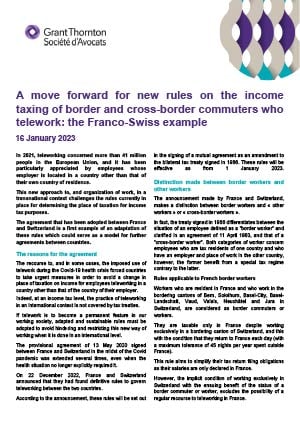In 2021, teleworking concerned more than 41 million people in the European Union, and it has been particularly appreciated by employees whose employer is located in a country other than that of their own country of residence.
This new approach to, and organization of work, in a transnational context challenges the rules currently in place for determining the place of taxation for income tax purposes.
The agreement that has been adopted between France and Switzerland is a first example of an adaptation of these rules which could serve as a model for further agreements between countries.
The reasons for the agreement:
The recourse to, and in some cases, the imposed use of telework during the Covid-19 health crisis forced countries to take urgent measures in order to avoid a change in place of taxation on income for employees teleworking in a country other than that of the country of their employer.
Indeed, at an income tax level, the practice of teleworking in an international context is not covered by tax treaties.
If telework is to become a permanent feature in our working society, adapted and sustainable rules must be adopted to avoid hindering and restricting this new way of working when it is done in an international level.
The provisional agreement of 13 May 2020 signed between France and Switzerland in the midst of the Covid pandemic was extended several times, even when the health situation no longer explicitly required it.
On 22 December 2022, France and Switzerland announced that they had found definitive rules to govern teleworking between the two countries.
According to the announcement, these rules will be set out in the signing of a mutual agreement as an amendment to the bilateral tax treaty signed in 1966. These rules will be effective as from 1 January 2023.
Distinction made between border workers and other workers:
The announcement made by France and Switzerland, makes a distinction between border workers and « other workers » or « cross-border workers ».
In fact, the treaty signed in 1966 differentiates between the situation of an employee defined as a “border worker” and clarified in an agreement of 11 April 1983, and that of a "cross-border worker". Both categories of worker concern employees who are tax residents of one country and who have an employer and place of work in the other country, however, the former benefit from a special tax regime contrary to the latter.
Rules applicable to French border workers:
Workers who are resident in France and who work in the bordering cantons of Bern, Solothurn, Basel-City, Basel-Landschaft, Vaud, Valais, Neuchâtel and Jura in Switzerland, are considered as border commuters or workers.
They are taxable only in France despite working exclusively in a bordering canton of Switzerland, and this with the condition that they return to France each day (with a maximum tolerance of 45 nights per year spent outside France).
This rule aims to simplify their tax return filing obligations as their salaries are only declared in France.
However, the implicit condition of working exclusively in Switzerland with the ensuing benefit of the status of a border commuter or worker, excludes the possibility of a regular recourse to teleworking in France.
Rules applicable to French cross-border workers:
Conversely, the salaries of cross-border workers are taxable in the country where they work and not where they live.
Thus, Swiss salaries paid to a worker resident in France, are taxable in Switzerland but must also be declared in France by the worker (with the application of a tax credit to reduce any double taxation).
Cross-border workers are therefore unable to benefit from any simplification measure of income tax filing.
A threshold of telework allowed and limited to 40%:
According to the announcement made by the two countries, a significant adjustment will be made in the establishing of a threshold below which the practice of actual teleworking would remain neutral from a tax rule perspective.
Border workers:
Border workers will be able to telework up to a limit of 40% of their working time.
Thus, the salaries of a French tax resident employed by a Swiss company would remain exclusively taxable in France provided that he works no more than 40% of his working time remotely in France and at least 60% in the employing country, Switzerland.
Should these limits not be respected, the employee’s salary would be taxable in France for any additional days worked remotely in France, as well as being taxed in Switzerland for the days worked in the latter.
Cross-border workers:
Conversely, for French resident employees who work in Switzerland but who do not have border worker status, their salaries would be taxable only in Switzerland, provided that any remote work carried out from France does not exceed 40% of the total working time.
Thus, the salaries of a French tax resident working for an employer located in the canton of Geneva, will be taxed only in Switzerland provided that he/she works no more than 40% of his/her time in France and a minimum of 60% of the working time in Switzerland.
Where not respected, the rule which has been applicable to date shall be maintained: the employee’s salary will be taxable in France for those days worked in France and equally in Switzerland for the days worked in Switzerland.
Observations:
This agreement makes it possible to maintain a simplified method of declaration for border workers who do not telework more than an average of two days a week. Further details to come on the calculation method may give more or less flexibility in the calculation of the threshold.
The agreement also covers cross-border workers, allowing them to benefit from a specific income tax filing regime, where no particular rules had been in place for them until now.
Following this agreement, the difference in treatment between border workers and cross-border workers is reduced since their salaries are now only taxable in one country, however the rule of the country applying the taxation is opposed: that of exclusive taxation in the country of residence for border workers and exclusive taxation in the country of the employing company for cross-border workers.
The situation of teleworking is thus considered as “neutralized” for simplification of tax purposes, but only up to a certain threshold. Companies that have allowed their employees a large degree of flexibility in the management of their working time will have to consider the tax impact if their employees remote work in their country of residence for more than the set average of 2 days a week.
It will be interesting to see whether this agreement will serve as a model for the adoption of identical rules by France and other border countries, and even more broadly at the European and international level within the OECD.
Great interest will also be paid to see whether for the sake of consistency, and more notably concerning the threshold, the same rules could be applied for determining the place of payment of social security contributions. Logic suggests that these should also evolve to take account of cases of border and cross-border teleworking.






